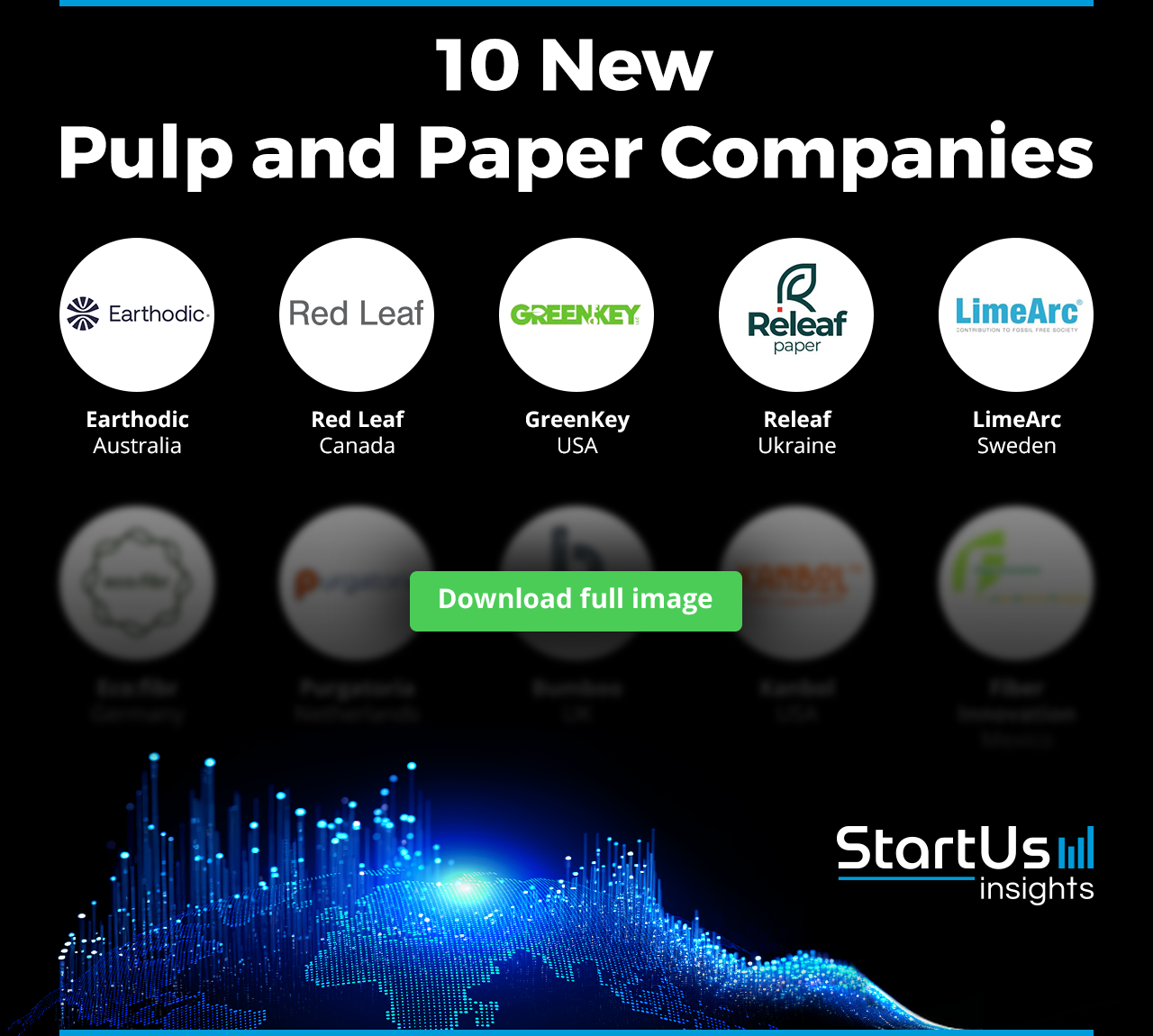Amidst an era of environmental consciousness and innovation, the pulp and paper industry is experiencing a shift driven by the advancements in new pulp and paper companies. These companies enhance traditional practices with technological advancements such as alternative fibers, recycled molded fiber packaging, and fallen leaves-based pulp production.
This article delves into the developments within the pulp and paper industry, offering detailed insights into:
- Emerging Trends Shaping the Pulp and Paper Sector
- Profiles of 10 Pioneering New Pulp and Paper Companies
- How to Scout Innovative Pulp and Paper Companies Easily

Key Takeaways
Drawing insights from the Big Data & AI-powered StartUs Insights Discovery Platform that provides data on over 4.7+ million emerging companies globally, we explore the evolving landscape of the pulp and paper industry. This sector is marked by key trends and a substantial workforce, shaping its future. Here are some key insights at a glance:
- Pulp and Paper Trends: Some of the latest pulp and paper trends include biotechnology, recycling tech, nanocellulose, sustainable packaging, and alternative fibers.
- Pulp and Paper Industry Stats: The pulp and paper sector comprises 45K+ organizations. On average, the industry employs about 37 people in 4.6K+ new companies founded in the last five years, witnessing 2020 as the average founding year. Moreover, the average funding received by the industry in the same span is 8.6 million.
- Top 10 Pulp and Paper Companies to Watch:
- Red Leaf – Climate Positive Alternative Fiber
- GreenKey – Biomass-based Pulp Manufacturing
- Releaf – Fallen Leaves-based Sustainable Products
- Eco:fibr – Residual Pineapple Leaves-Based Pulp Production
- LimeArc – Sustainable Lime Mud Reburning
- Purgatoria – Toilet Roll Waste Reduction
- Earthodic – Bio-based Water Resistant Coatings
- Bumboo – 3-ply Bamboo Toilet Tissue
- Kanbol – Agricultural Residue-based Packaging
- Fiber Innovation – Recycled Molded Fiber Packaging
Latest Trends Reshaping the Pulp and Paper Industry
Biotechnology
Biotechnology introduces eco-friendly and efficient processes such as enzymatic treatments to enhance pulp properties, reduce energy consumption, and reduce the need for harsh chemicals in bleaching processes. Biotechnological advancements also facilitate the breakdown of lignin, allowing easier fiber separation and contributing to higher pulp yields.
Recycling Tech
Recycling technology drives sustainability and resource conservation in the pulp and paper sector. Advanced sorting and processing techniques improve the efficiency of recycling operations, enabling the extraction of high-quality fibers from waste paper. This contributes to reduced reliance on virgin wood, conserving forests, and reducing the industry’s carbon emissions.
Nanocellulose
Nanocellulose, a material derived from cellulose fibers at the nanoscale, includes unique properties such as high strength, lightweight, and biodegradability. Thus, it makes a helpful material for reinforcing paper products, creating barrier films, and developing innovative packaging solutions.
Sustainable Packaging
Sustainable packaging integrates renewable materials, such as plant-based fibers and recycled content, to develop strong and recyclable packaging solutions. Technologies to improve the barrier properties of paper, making it resistant to water, oil, and gasses, are also advancing. This allows for wider applications in food and pharmaceutical packaging.
Alternative Fibers
The exploration of alternative fibers offers sustainable raw material sources beyond traditional wood pulp. Agricultural residues such as straw, hemp, and bamboo, as well as recycled textiles, are processed to make pulp for paper and packaging products.
Also read: Top 10 Pulp and Paper Trends & Innovations
Discover 10 Out of 4.6K+ Emerging Pulp and Paper Companies
In this segment, we spotlight the top 10 pulp and paper companies in the world that are redefining the landscape of sustainability. These innovators leverage advanced technologies and eco-friendly materials, addressing critical environmental issues like waste reduction, recycling challenges, and the carbon footprint associated with traditional pulp and paper manufacturing processes.
Note on Signal Strength
One of the unique metrics we feature for each company is Signal Strength, a proprietary data point generated by our Discovery Platform. Signal Strength gauges the extent to which a company’s influence has permeated the global ecosystem of startups, scaleups, and emerging companies. This proprietary metric serves as a valuable guidepost for understanding a company’s standing in the broader market landscape.
1. Red Leaf
- Founding Year: 2019
- Employee Range: 2-10
- Location: Canada
- Signal Strength: Very Strong
- What they do: Red Leaf Pulp converts wheat straw into climate-positive alternative fiber. It provides market pulp to make tissue and towels, pellets for replacing natural gas or coal, and lignin as a coating for electronics and batteries. Leveraging proprietary production processes, Red Leaf offers a greener alternative to traditional kraft wood pulp. It also provides key performance benefits for products like tissue, packaging, and specialty papers.
2. GreenKey
- Founding Year: 2019
- Employee Range: 2-10
- Location: USA
- Signal Strength: Strong
- What they do: GreenKey transforms agricultural and marine biomass waste into sustainable pulp and extractions for the paper, packaging, and cellulose industries. GreenKey converts materials like hemp and sargassum into nanocellulose, a renewable substitute that reduces reliance on fossil fuels and curtails waste production. Also, nanocellulose is known for strength and rigidity, making paper products and composite materials strong.
3. Releaf
- Founding Year: 2021
- Employee Range: 11-50
- Location: Ukraine
- Signal Strength: Medium Strong
- What they do: Releaf turns fallen urban leaves into eco-friendly paper bags. The process begins with the collection of leaves, followed by cleaning, drying, and granulation. These granulated leaves convert into a special fiber with a filler to press and roll into paper. This approach accumulates biological waste from leaves and tackles the negative impact of traditional paper manufacturing on forests. Further, it reduces deforestation and CO2 emissions associated with conventional paper production.
4. Eco:fibr
- Founding Year: 2022
- Employee Range: 2-10
- Location: Germany
- Signal Strength: Very strong
- What they do: Eco:fibr transforms pineapple plant residues into eco-friendly pulp. This pulp then goes to the paper industry for the production of specialized papers like wall coverings and packaging. The process avoids sulfur-containing chemicals and chlorine-based bleaching agents and opts for oxygen-based bleaching instead. Thus, it requires lower temperatures, pressures, and eliminates harmful chemicals.
5. LimeArc
- Founding Year: 2019
- Employee Range: 2-10
- Location: Sweden
- Signal Strength: Strong
- What they do: LimeArc’s plasma technology modernizes the Kraft pulp process by transforming lime mud reburning into an environmentally friendly procedure. Utilizing electrically generated plasma at extremely high temperatures, this method accelerates the calcination process and minimizes the industry’s carbon footprint by eliminating the need for fossil fuels. Instead, it leverages fossil-free, climate-neutral electric power, facilitating the capture of high-concentration, biogenic CO2 emissions.

6. Purgatoria
- Founding Year: 2021
- Employee Range: 2-10
- Location: Netherlands
- Signal Strength: Very Strong
- What they do: Purgatoria manufactures Icabus, a wastewater sieve designed to tackle the toilet roll waste challenge. Icabus features larger holes’ sieves for capturing toilet paper fibers in sewage. It then facilitates the conversion of the extracted pulp into biogas through fermentation, thus generating energy and significantly reducing waste.
7. Earthodic
- Founding Year: 2022
- Employee Range: 2-10
- Location: Australia
- Signal Strength: Very Strong
- What they do: Earthodic’s Biobarc advances sustainable packaging with its bio-based, water-resistant paper coating. Its design enables protection against moisture, oil, and grease, with further developments underway for water vapor and oxygen barriers. Ideal for a variety of applications, including cold chain and industrial packaging, Earthodic’s solution contributes to the circular economy.
8. Bumboo
- Founding Year: 2019
- Employee Range: 2-10
- Location: UK
- Signal Strength: Very Strong
- What they do: Bumboo uses bamboo as an alternative to traditional virgin wood pulp and recycled paper for toilet tissue. Bumboo’s toilet tissue, crafted from rapidly renewable bamboo instead of trees, fosters sustainable living. Its white paper undergoes a bleaching process utilizing a combination of oxygen and hydrogen peroxide, making it chlorine-free (TCF). Moreover, it is recognized as one of the most eco-friendly methods for paper bleaching.
9. Kanbol
- Founding Year: 2020
- Employee Range: 1-10
- Location: USA
- Signal Strength: Medium Strong
- What they do: Kanbol develops FlowForm, a proprietary technology for sustainable packaging. It transforms corn stover, the agricultural residue from corn harvest, into durable, molded containers through a calibrated cooking process. Its products include molded fiber bowls, and meat and produce platters. This technology reduces chemical usage, carbon footprint, and supports local agriculture, aligning with businesses aiming to improve their Scope 3 Emissions.
10. Fiber Innovation
- Founding Year: 2019
- Employee Range: 11-50
- Location: Mexico
- Signal Strength: Medium Strong
- What they do: Fiber Innovation specializes in molded fiber packaging solutions. The production cycle starts by locally sourcing recycled fibers, then breaking down these fibers, mixing them with water, and molding them into packaging components. Solar energy powers the drying process, after which the production scraps undergo recycling into new parts, eliminating waste, and re-entering the fiber stream without environmental impact.
Tips to Quickly Find New Pulp and Paper Companies
Utilizing a SaaS platform like the Discovery Platform for identifying new pulp and paper companies provides significant benefits compared to traditional scouting methods:
- Streamlined Efficiency: The Discovery Platform offers advanced tools that streamline the scouting process. It replaces your hours of conventional desk research, saving time and resources in identifying pulp and paper innovations.
- Access to Real-time Insights: Gain a competitive edge with up-to-date information on the latest trends in the pulp and paper industry. The platform keeps you informed with near real-time updates on emerging pulp and paper industry companies and news, enabling you to make swift and informed decisions.
- Tailored Exploration: Customize your search to focus on specific niches within the pulp and paper sector, such as bio-based water-resistant coatings, climate-positive alternative fibers, or sustainable lime mud reburning. The platform’s diverse filtering options allow you to target your scouting efforts precisely, ensuring that you find the most relevant and groundbreaking companies in the field.
Ready to Explore All New Pulp and Paper Companies?
This overview highlights just a few pulp and paper solutions of all 4.6K+ new companies currently covered by the Discovery Platform. To explore them all, book a personalized demo or download one of our free Industry Innovation Reports for a quick overview.










